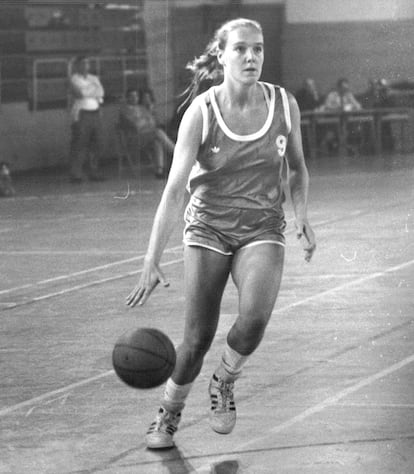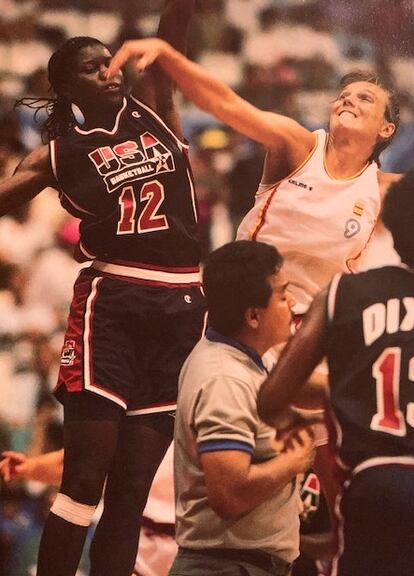His medal, the gold that changed everything for Spanish basketball, rests in a drawer.
“I’d have to search to find it, yes.” It must be out there.
However, those of his sons’ world champions, Willy and Juancho Hernángomez, he treasures “like gold on cloth.” The expression never had such a literal meaning.
This is Margarita Ivonne Geuer (Seville, 1966), Wonny Geuer ―which is pronounced something like Bony Goia―, the granddaughter of a woman who danced with Alfonso XIII, wife of the German consul in Seville who survived two world wars; the one who taught his mother, and Wonny in turn, to ignore the temptation to give up; the tennis fan who gave the lug and, after much “bouncing against a wall and doing jumping exercises” came to dominate the hoops. The first champion of Spanish basketball (gold in the Eurobasket of Perugia in 1993) and the beginning of a saga that is, at the same time, a legend and a future of the homeland basket, the Hernángomez-Geuer, an unusual family: the five members have dressed the national team’s jersey in training categories (135 times among all, a record that is difficult to beat) and three, so far, have been absolute internationals.
This is Wonny Geuer, the heart of this lineage, capable of grasping the then Minister of Culture and Sports, José Guirao, with recently rinsed tears, in the China pavilion where his children had just made Spain world champion for second time in her story, to make it clear to her what is essential for her, what is really important:
“One thing has to be urgently fixed. It is a pity that my daughter Andrea and her companions, in order to combine studies and a sports career, continue to have to go to the US It has hardly changed since my time …
He started out playing tennis. It was the sport that, along with skiing, the girl Wonny had seen her parents practice, a German family settled in the Andalusian capital. But she wanted to be part of a team and a friend of her sister’s recruited her; Francisco Álvarez, the coach of the Irlandesas Bami school in Seville, a squad that had reached the first division at the beginning of the eighties but, due to lack of income, had been forced to give up its position. Wonny barely played a minute. But it exceeded meter eighty, so it ended up summoned to a concentration that was held in Cáceres. The country was then looking for the athletes who were to represent it in its Olympiad, in Barcelona 92. Wonny sprained an ankle, the reports that the scouts made about her at that appointment were devastating: there was nothing to scratch in that player. When he returned to Seville, he wanted to hang up his boots. “My mother, as my grandmother would have said, said to me: ‘Daughter, you leave it when you are sure you do not like it, not because you have not been good at it or because of what they tell you. First train ”. Wonny says that one day, red-handedWhile she was buying the books for school, her coach caught her: “He almost took me home by the hand, to the shoes, and from there to the pavilion.” That year they won the Spanish championship. Wonny was the top rebounder. He signed for Canoe, he went to Madrid on a scholarship; and then what to say about what came next? The ADO plan, four years of intensive preparation, the forging of the generation that achieved the longed-for first gold, the friendship with Carolina Mújica or Mónica Messa, with whom there are still baskets.

“In my family, if we stand out for something, it’s because of our tenacity.” For competitiveness, in the best sense of the word: capacity for effort, sacrifice.
He retired at the top, aged 27, with the good aftertaste of gold; partly from exhaustion and partly from her desire to be a mother. And it is that not only had the metamorphosis been exhausting until she became an elite athlete, the crushing of days of up to eight hours of physical exercise. Another factor, one very important to her, had required blood and sweat. The studies.
She was studying economics and business, a career in which she would eventually graduate, like her husband. The preparation of the Olympic Games forced her to be absent sometimes. The Higher Sports Council had sent explanatory letters to the faculty, without any success.
―The dean told me: “My girl, you have an age to know if what you want is to play ball or study.”
“What did you answer?”
“That the little ball was what my studies were paying me for.”

Wonny Geuer says that he has had to live these same situations afterwards on numerous occasions with his children: visits to the institute to justify to some teachers the absences of their offspring, who were competing outside or training, or the temporary drop in performance in an exam; And that since then he has not stopped repeating the same speech, the one that he took the opportunity to transfer a minister in full moment of euphoria, but also the one that has instilled in his progeny:
—Even though you seem called to be the next Pau Gasol, study; life changes in a second.
Geuer’s speech is combative because it is the result of experience, of what he has seen around him for two generations. “We cannot allow these young people to lose track of reality, they must be able to return to Earth and work. And, equally, on the contrary: why did my daughter’s classmates who started Medicine have to give up basketball? The values that a team sport gives you, whatever, are those that shape you, and they serve you if you become a professional or in the face of an opposition or in a company … How can it be that we do not have that in mind? ”.
Geuer is right. According to a report sponsored by Endesa, conflicts between study and training are the main cause of dropping out of sports, especially among adolescent girls. “My children have their father’s mirror: an injury cut off their projection. And, although sometimes they call me annoying for repeating it to them, they are aware and take it into account: that is why Andrea went to an American university [continúa otra tradición familiar: se licenciará en finanzas]; That’s why Juancho wanted to get a degree in Physical Education and Early Childhood Teaching and Willy studies online as he continues to progress in his NBA career.

Champions sons of champions (how to train them without pressure)
Willy and Juancho started out playing soccer. As children, they weren’t even remotely aware of the magnitude of their mother’s career. “They had seen a photo, nothing more.” They knew that their mommy was going to play pachangas with her friends – who were actually her companions from that Perugia hit. And they thought, Wonny says, “that basketball was a girl thing.” Then, they too had to give the stretch and they began to stand out in the quarries of clubs like Real Madrid or Estudiantes, a terrain that is beginning to be shifting, due to the illusions that are awakened and the frustrations that usually ensue; between young people and, perhaps worse, between parents, who, Wonny says, put an absurd pressure on their shoulders prematurely. “I never made sense of some of the things that I encountered when my children were young. With the accumulated experience, I thought that it is impossible to discern if a player of that age is going to become a professional or not, I had no idea if my children would achieve it! And you know what? That was always the least of it. I repeated to them what had served me: have fun. There is the key. The one who is able to continue having fun even while competing is the one who has everything won ”.

Wonny says that when Andrea was seven years old, a relative approached her and asked: “But hey, with your parents and siblings, how can you not play basketball?” The girl replied that because her mother had not taken her yet.
“I was only seven!” I then asked him: Are you sure you want, Andrea? And until now. I have always respected the three of them to the maximum, I would not impose anything on them, and even less basketball. The only thing I always told them was to play sports and study …
#InteligentIsFollow
Discover, thanks to Endesa’s Basket Girlz project, the stories of all these athletes, scientists or cultural and business leaders who have something in common: they were forged on a basketball court. From this sport they acquired values that have served them for the rest of life’s challenges. www.proyectobasketgirlz.com
We want to say thanks to the author of this article for this amazing material
The surname engraved on the first and last gold medals of Spanish basketball
